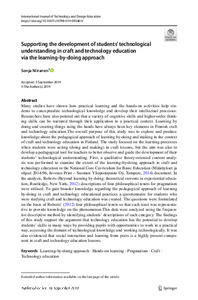Supporting the development of students’ technological understanding in craft and technology education via the learning-by-doing approach
Niiranen, Sonja (2019-09-16)
Niiranen, Sonja
16.09.2019
Julkaisun pysyvä osoite on
https://urn.fi/URN:NBN:fi:tuni-201910254094
https://urn.fi/URN:NBN:fi:tuni-201910254094
Kuvaus
Peer reviewed
Tiivistelmä
Many studies have shown how practical learning and the hands-on activities help students to conceptualize technological knowledge and develop their intellectual processes. Researchers have also pointed out that a variety of cognitive skills and higher-order thinking skills can be nurtured through their application to a practical context. Learning by doing and creating things using the hands have always been key elements in Finnish craft and technology education. The overall purpose of this study was to explore and produce knowledge about the pedagogical approach of learning-by-doing and making in the context of craft and technology education in Finland. The study focused on the learning processes when students were acting (doing and making) in craft lessons, but the aim was also to develop a pedagogical tool for teachers to better observe and guide the development of their students’ technological understanding. First, a qualitative theory-oriented content analysis was performed to examine the extent of the learning-by-doing approach in craft and technology education in the National Core Curriculum for Basic Education 2014 document. In the analysis, Roberts’ (2012) descriptions of four philosophical tenets for pragmatism were utilised. To gain broader knowledge regarding the pedagogical approach of learning-by-doing in craft and technology educational practices a questionnaire for students who were studying craft and technology education was created. The questions were formulated on the basis of Roberts’ (2012) four philosophical tenets so that each tenet was representative to provide knowledge on the phenomenon. This data were analyzed using the frequentist descriptive method by identifying students’ descriptions of each category. The findings of this study support the argument that technology education has the potential to develop students’ skills in many ways by providing pupils with opportunities to work in a practical way, accessing the domain of technological knowledge and working technologically. It was also evidenced that social interaction and learning from peers is a highly present component in craft and technology education lessons.
Kokoelmat
- TUNICRIS-julkaisut [16983]
